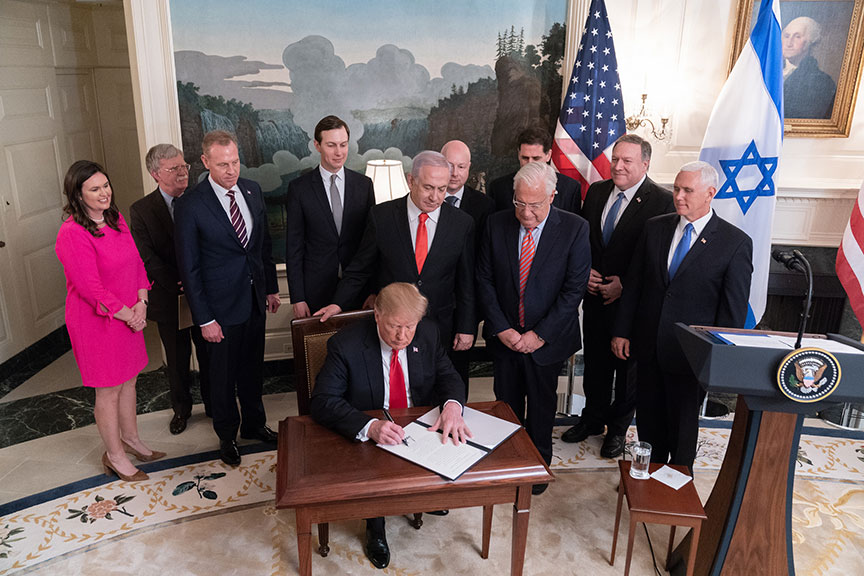Netanyahu and Trump Share The Tactics
This week, Israel came within hours of having new elections, for the fourth time in 18 months. At the last moment, the country received a reprieve. That reprieve was not the result of any torturous negotiations, but by the grace of a decision made by one person — Prime Minister Benjamin Netanyahu.
The prospect of a new election emerged after the judge presiding over Netanyahu's trial on charges of bribery, fraud, and breach of trust decided those proceedings would start in January and be convened three full days each week. Based on the court's ruling, which requires the prime minister to be present during his trial, Netanyahu fears the state's Attorney General could determine he would no longer be able to fulfill the duties of his office. As a result, Netanyahu would be compelled to temporarily step aside and allow Defense Minister Benny Gantz to take over. Netanyahu harbors hope that a new election might bring him the absolute majority that has eluded him so far, and which would allow for the passage of laws to grant him immunity from prosecution.
If Israel schedules a new election in March, Netanyahu is likely to demand his trial be delayed until after that vote — after all, would it be fair for Netanyahu to have to go to court three days a week, instead of campaigning?
The reasons why Netanyahu is able to unilaterally decide the answer to a question with such profound consequences for the country are worth exploring. It is not in the interest of Netanyahu's Likud party, nor is it in the country's interest as a whole, to hold a new election. Israelis have already gone to the polls three times in the last year, and as a result of COVID-19, the country is deep in the grip of the most significant economic and health crisis in its history.
How is it possible that despite being part of a large, diverse party, the opinions of one man, i.e., Netanyahu, are never questioned? Even though Netanyahu has been indicted and charged with serious crimes, not one single Likud Minister is willing to break away from him publicly.
The best answer to how Netanyahu maintains such firm control can be found by looking at the United States. How did a proud Republican Party, the party of free trade, immigration, support of NATO, and proponents of a firm, age-old policy of confronting Russia, go along with President Donald J. Trump's policy agenda, most of which constitutes an anathema to the traditional values of the party? How could the Republicans go into an election with no platform other than a rallying cry for support of Trump? In the case of Netanyahu and Trump, it is social media and the continual, systematic delegitimization of their respective political opponents that serve as fuel for their power.
During the past few weeks, Netanyahu and Trump have used remarkably similar rhetoric, both calling protesters “anarchists,” “haters of” (Israel, the United States, respectively), and immediately labeling anyone who opposes them an “enemy of the people.” Recently, a large banner went up outside the Prime Minister's residence, calling all leftist “traitors.”
Netanyahu claims, without any proof, that leftist demonstrators have threatened his life and the lives of his family. Earlier in the month, the Prime Minister went even further, sending a letter to Attorney General Avichai Mandelblit (the same Attorney General who will decide whether or not Netanyahu can continue to serve as Prime Minister once his trial begins), accusing the AG of doing nothing about the death threats, implying that if anything happens to the prime minister Mandelblit would have blood on his hands. Netanyahu, who likes to play the victim, then shared his letter on social media.
And here is where we get to the second element of the equation: Once we have defined our political rivals as the enemy — not only our enemy, but enemies of the state — or as Trump likes to call the press, “The enemy of the people,” anyone who supports any of “those people” must be a traitor.
All these inflammatory partisan political statements are amplified on social media. In the US, Trump uses Twitter and Facebook; while in Israel, Netanyahu utilizes the same media, plus WhatsApp groups, which are very popular here. Through the power and reach of social media, hundreds of thousands or even millions of people know, in an instant, precisely what Trump or Netanyahu thinks about something, or more importantly, someone.
In the United States, traditionally independent US Senators dare not open their mouths to criticize Trump, for fear that will Trump turn his social media ire against them. Likewise, Likud members who might oppose some of Netanyahu’s actions dare not disagree or denounce them, for fear that they risk the wrath of the thousands of Netanyahu faithful, if they do.
Much has been written about the dangers posed by social media in spreading fake stories and disinformation. However, we simultaneously celebrate the fact that social media is also a great leveler, giving a voice to many who had previously gone unheard. That being said, now it is time to think about other consequences of the medium — i.e. how social media can be an exceptionally useful tool in a populist leader's hands, to discourage discussion, dampen dissent, and swiftly shut it down. Shoving the social media genie back into the bottle is impossible. Nevertheless, we urgently need to understand the unintended adverse consequences generated by social media and its profound power, not only to reshape society, but to be controlled and manipulated by leaders in highly destructive ways. We must find solutions to regulate the use of social media in ways that can address these problems the sooner the better.

